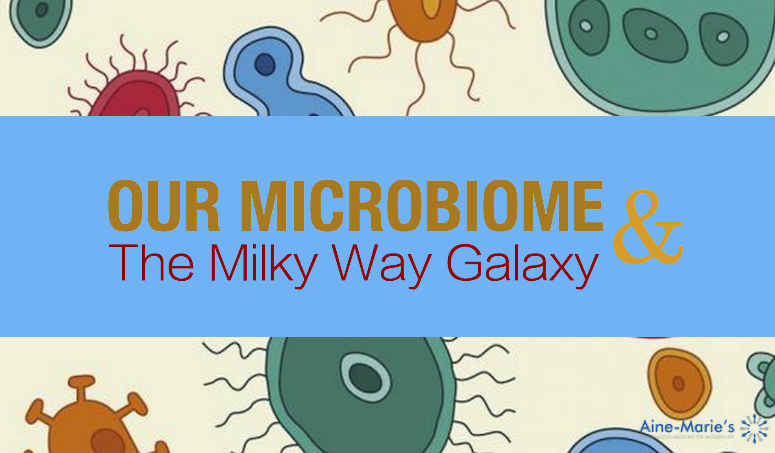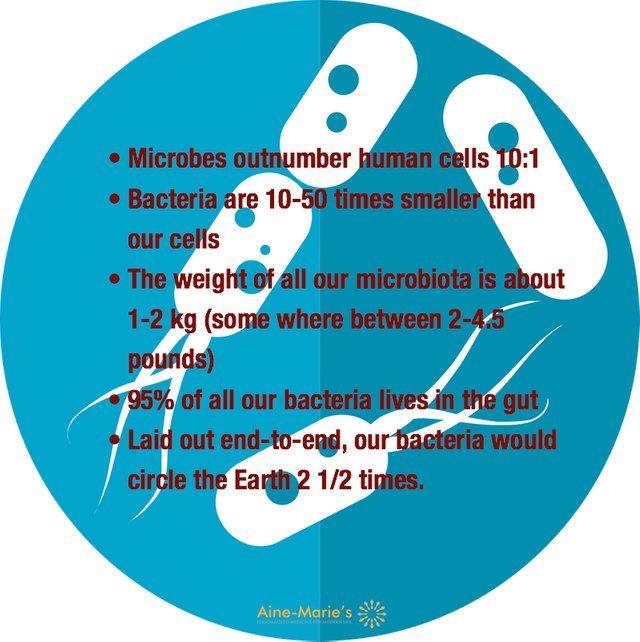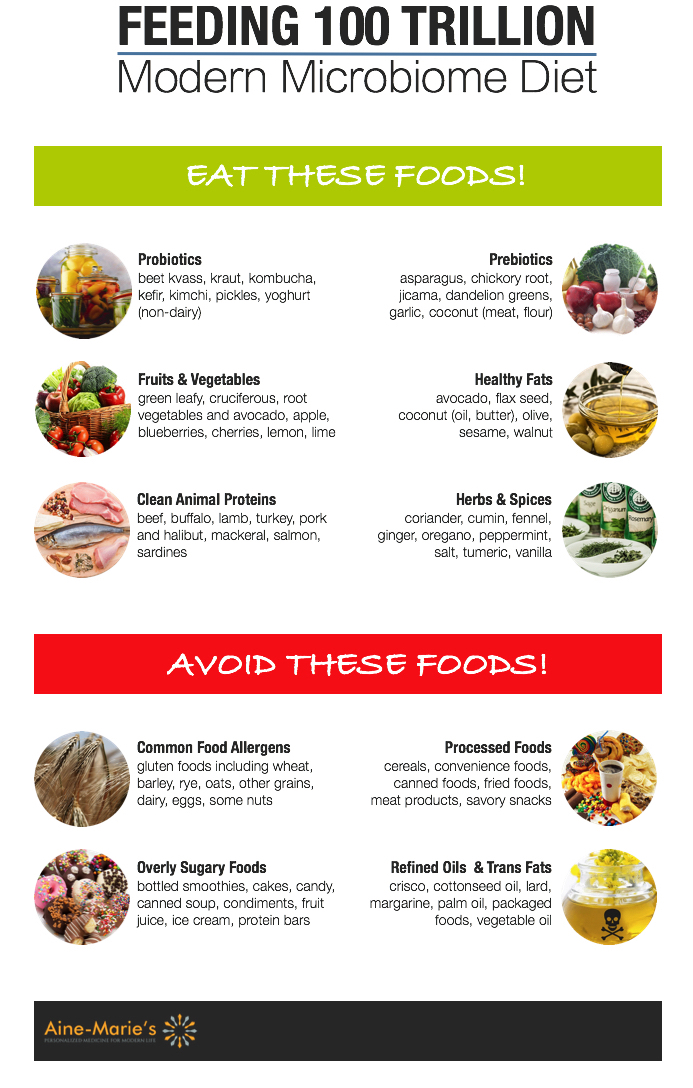Our Microbiome & The Milky Way Galaxy

Our gut is home to 100 trillion microorganisms with over 400 species. It’s probably one of the most diverse ecosystems on the planet!
Not that long ago doctors would just write off things like brain fog, depression and mood swings as just poor mental health. Chronic headaches and inflammation were thought of as normal parts of life.
But now we can look more closely at these things and don’t just sweep them under the rug. We now understand that these symptoms and conditions are all some how related to our gut microbiome.
Vast As The Milky Way Galaxy
Probably one of the largest and most intricate of our inner ecosystems is the gut microbiome, which contains literally trillions of bacteria and other microorganisms, collectively known as gut microbiota.
This invisible ecosystem is as vast and mysterious as the Milky Way Galaxy and it is networked with key body systems such as the brain, nervous, endocrine, and cardiovascular. It is this all-important multi-system connection (or matrix) that paves the way for preventing and healing many chronic health conditions.
Like genes, our microbes pass from parent to child, especially at the moment of birth when the infant is exposed to the microbes in its mother’s birth canal. The infant swallows some of the mother’s microbes, intern seeding their own newly formed gut flora populations.
Our gut microbiome continually evolves and responds in kind to our fluctuating environment i.e., stress, emotions, food, toxins, pollutants and exercise.

Biological Influencers
These microscopic organisms take part in digesting food, controlling appetite, regulating metabolism and they even instruct the immune system and impact emotions and mood.
These tiny microbiota even influence how our genes are expressed… whether they are turned “on” or “off” and will create a health condition.
Incredibly, one of the most important functions of the trillions of microbiota is to act like a giant message hub of bidirectional communications between the gut and brain via the nervous system. They signal the release of hormones (our chemical messengers in the body) in order to respond to stress, memory and all the intricate biological mechanisms that keep the “lights on” every moment of our lives.
Microbiota Links To Disease
Constantly emerging research on the microbiome is showing evidence that gut microbiota are linked to autoimmune disease, heart disease, brain/neurological conditions, leaky gut, IBS and obesity.1
Researchers even believe that alterations in the intestinal flora may be an important link to the skyrocketing epidemic of food allergies and sensitivities.2 We know that certain species of bacteria assist in the breakdown of gluten proteins, and a lack of these may predispose a person to gluten intolerance.
Another digestive disorder that is more prevalent than previously believed, is small intestinal bacterial overgrowth, or just called SIBO, and symptoms can range from chronic diarrhea and weight loss, to bloating and malabsorption.3
Finally, our gut bacteria play a big role in absorbing vitamins and nutrients during the digestive process. If they can’t do their job or there aren’t the right types of bacteria present in the gut, then we just aren’t able to take in all the nutrients from our food.
Probiotics Are The Good Bacteria
Probiotics are live bacteria and yeast that are important in maintaining optimal digestion. Products on the market today that are sold as probiotics include dietary supplements, beverages like kombucha and kefir, fermented foods like kraut and yoghurt, and products used topically, such as skin creams.
Think of probiotics as the “good” bacteria that help your gut (and body!) thrive. They protect you from infection, harmful parasites, fungi and more.
Probiotics may contain a variety of microorganisms. Bifidobacterium and Lactobacillus families are two popular strains of probiotics that aid in healing and repairing the gut and microbiome. Yeast called Saccharomyces boulardii is also an important gut-health strain.
Each individual has a unique gut microbiome, sort of like a fingerprint, that changes constantly, and different strains and compositions of bacteria are needed in order to create the best internal terrain for good digestion and health.
You can get your probiotics from food as well as supplements. Good sources are: fermented foods like sauerkraut, kefir, kimchi, yoghurt, and fibers like chia and flax seeds.
Prebiotics Feed Your Bacteria
Don’t confuse prebiotics with probiotics—they are two different things. Prebiotics refers to dietary foods and supplements that promote the growth of the beneficial bacteria in your gut. Think of probiotics as the good bacteria living in your gut and prebiotics as the fertilizer that helps them grow strong and healthy.
These indigestible plant fibers found in foods like jicama, asparagus, leeks, dandelion greens, and seeds like flax and chia, are the perfect foods for your gut microbiota. These foods are often better than taking supplements because they often survive the acidic and intensive digestive process, making it all the way to the large intestine, where hungry bacteria are waiting.
Fiber found in fruits and vegetables are great prebiotics because the beneficial gut bacteria such as Lactobacili and Bifidobacteria actually feed on these fibrous foods.
Diets lacking in good fiber can starve the healthy bacteria in the gut and promote growth of the harmful bacteria. As a rule of them, these “bad” bacteria, referred to as gram-negative, can irritate and even break down the gut lining and cause a condition called leaky gut.

Antibiotics, Medications & Toxins
Antibiotics destroy both good and bad bacteria in the gut for months, years and even some of them… permanently. Unfortunately doctors over prescribe these medications for anything from earaches to the common cold. The truth is, you don’t need antibiotics for every little ache and pain and there are alternative remedies.
Medications like Advil, Aleve, Motrin, immune suppressants and other biologics, have been shown to destroy the gut lining and important bacteria. So while a chronic health condition may require the short-term use of these medications to manage pain or inflammation, they are not ideal as long-term remedies.
Everyday we come in contact with harmful environmental toxins in the air, on food, and in the water. One of the most dangerous toxins is glyphosate, an active ingredient in the pesticide Roundup. Developed as an antibiotic, glyphosate is an extremely problematic toxin with a long list of adverse reactions in the body including damaging the gut lining, leaky gut, as well as contributing to overgrowth of harmful bacteria.4
Other dietary foods can also be harmful to your microbiome and tend to support an overgrowth of unwanted bacteria. These would include overly sugary foods and artificial sweeteners like Splenda and Nutrasweet. A gut over loaded with sugar is ripe for Candida and other yeast overgrowth.
Just to Recap about the Microbiome…
- The gut microbiome continually evolves and responds in kind to our fluctuating environment i.e., stress, emotions, food, toxins, pollutants and exercise
- Antibiotics destroy both good and bad bacteria in the gut for months, years and even some of them… permanently
- Consume fermented foods and probiotics, since these may help prevent the occurrence of things like food allergies (esp. in children), bacterial overgrowth, leaky gut, etc.
- Get a diverse strain of probiotics in your diet (or supplement). Beneficial strains are: bifidum, B. lactis, B. animalis, L. salivarius, L. paracasei, and L. rhamnosus
- Taking a microbiome “selfie” can help you identify infections, bacteria overgrowth, parasites, and imbalances in your gut flora.
Have YOU been looking for the right gut health testing that looks at leaky gut and microbiome health? Here’s the remedy… Gut Health Secrets 8-Week Gut & Microbiome Boot Camp. This is the only boot camp for turning your gut health around and jump starting your journey back to optimal health. Click HERE for more information about my functional nutrition programs.
References:
1 DuPont, A. W. & DuPont, H. L. Nat. Rev. Gastroenterol. Hepatol. 8, 523–531 (2011)
2 Rachid R, Chatila TA.The role of the gut microbiota in food allergy. Curr Opin Pediatr.2016 Dec;28(6):748-753.
3 Dukowicz, A. C., Lacy, B. E., Levine, G. M. (2007). Small Intestinal Bacterial Overgrowth. Gastroenterol Hepatol (NY). Feb:3(2): 4 Smith, J. Correlation Of Rising Incidence Of Diseases And Chronic Health Conditions With GMOs And Glyphosate; published online at http://responsibletechnology.org